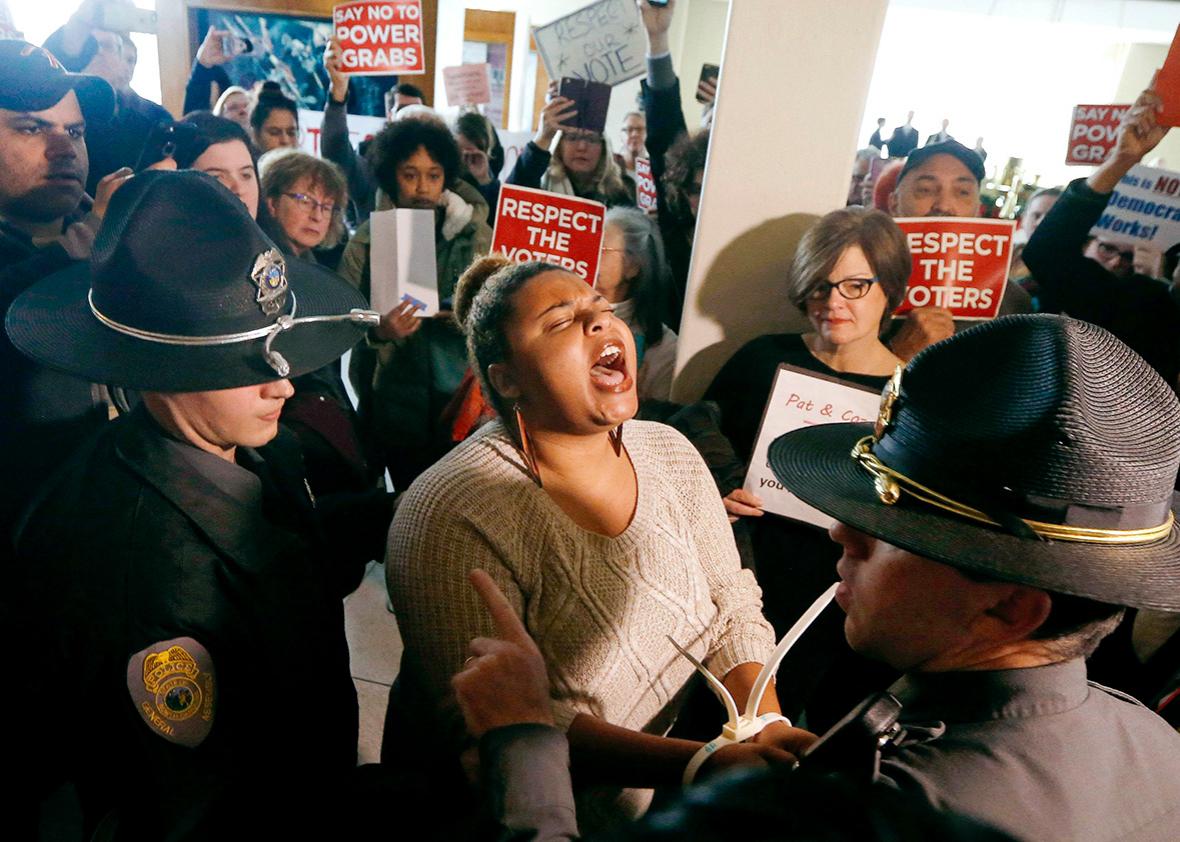Protesters opposing North Carolina Republicans’ brazen legislative coup descended upon the state capitol on Friday as GOP legislators continued to pass bills seizing power from the recently elected Democratic governor. In the halls of the House, more than 100 protesters chanted defiantly; some also shouted their opposition from the House gallery. Police have arrested at least 17 protesters thus far Friday, the same number they arrested Thursday.
Meanwhile, legislative Republicans appear undeterred by protests, or by incoming Democratic Gov. Roy Cooper’s threat to challenge the power grab in court. Both chambers easily passed SB4, one of the most far-reaching bills, on a party-line vote. The measure merges the State Board of Elections with the State Ethics Commission and increases its size. Currently, the state election board is made up of five members, with three from the governor’s party. SB4 gives the board eight members—four Democrats and four Republicans. A Democrat will chair the board in odd-numbered years, when there are normally no elections, and allow a Republican to chair the board in even-numbered years, when state and federal elections are typically held. This means that in years when the board is tasked with refereeing elections—deciding whether to hold recounts, hearing allegations of fraud, and so on—it will be chaired by a Republican.
The bill also overhauls county election boards. Under current law, each county board is made up of three members, including two from the governor’s party. SB4 prevents Democrats from taking control of these boards by giving each election board four members—two Democrats and two Republicans. Had Democrats gained a majority on election boards, as they were set to do under existing law, they would’ve been able to reverse Republican-led rollbacks to early voting and disenfranchisement of minority voters.
SB4 is arguably the most disturbing of the new bills being introduced by Republicans, since it prevents Democrats from pushing back against Republicans’ efforts to suppress minority voting. Outgoing Republican Gov. Pat McCrory signed it into law on Friday afternoon. McCrory also nominated Yolanda Stith, a former lobbyist and his chief of staff’s wife, to the Industrial Commission, which administers workers’ compensation and related benefits programs. The House and Senate moved quickly to confirm her and extended her term by six years. Additionally, the legislature restructured the commission to let McCrory designate a chairman, who will serve a four year term; previously, Cooper would have been empowered to designate the commission’s chairman once he took office.*
Both chambers will continue to debate the remaining bills, including one that strips power from the newly progressive state Supreme Court, and several others that diminish Cooper’s authority to make appointments. Because of a racial gerrymander that was ruled unconstitutional this summer, Republicans hold a supermajority in both chambers and are expected to pass most of the measures proposed by Friday evening.
*Update, Dec. 16, 2016: This post has been updated to clarify the restructuring of the Industrial Commission.
